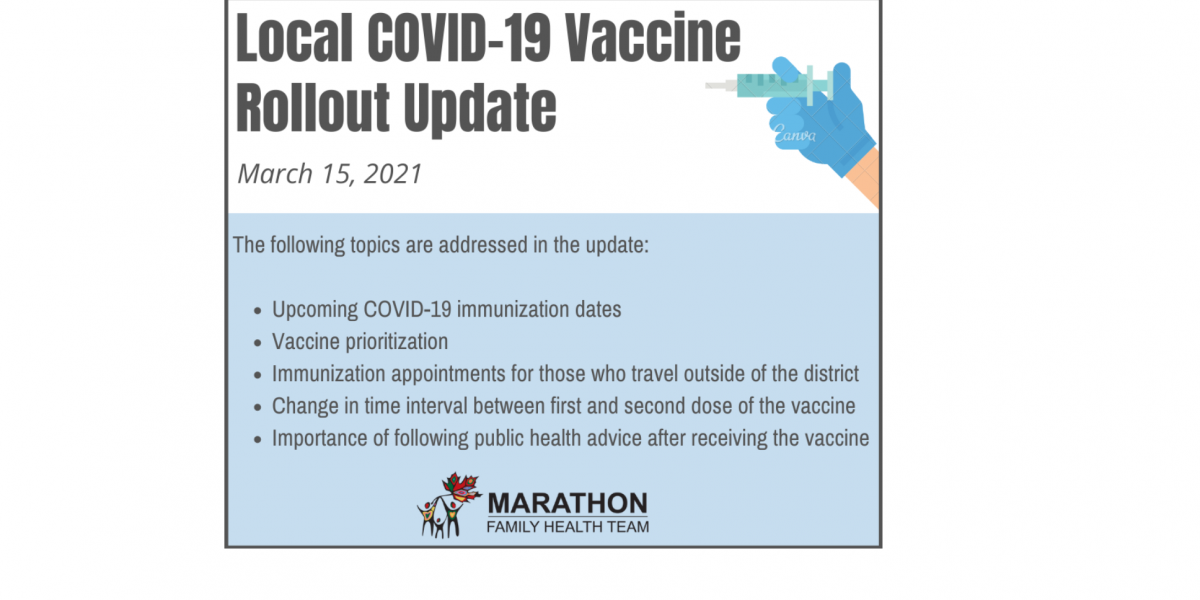Below is an update from the Marathon Family Health Team (MFHT) regarding the COVID-19 vaccine and our local vaccine rollout plan.
Upcoming COVID-19 immunization clinics and vaccine prioritization
It has been confirmed! The MFHT will be offering COVID-19 immunization clinics on March 25th, April 1st and April 8th. These clinics will allow us to target other specific Phase 1 priority groups who have not yet received a first dose of the vaccine.
By mid-April, the following groups are expected to be offered a COVID-19 vaccination appointment:
- Adults who are 80 years and older
- Adult chronic home care recipients and their essential care partners
- Indigenous adults (ages 55 years and older)
- Remaining healthcare workers in the highest and very high prioritization category
- Healthcare workers who meet the criteria for the high and moderate category
To prepare for the upcoming clinics, the MFHT is currently working on identifying individuals who meet priority criteria. If you believe yourself to be in a Phase 1 priority group and have not yet heard from us, please contact the clinic by emailing [email protected] or calling 807-229-3243.
COVID-19 immunization appointments for individuals who have traveled outside of the district
To help keep our patients and staff safe and to reduce virus transmission in our facility, the MFHT is currently not offering in-person appointments to individuals who have travelled outside of the Thunder Bay district in the last 14 days. We recognize that this policy presents challenges for individuals who require to travel outside of the district for essential reasons (e.g., work or medical appointments), especially if they are interested in receiving a COVID-19 vaccine.
With that said, we are pleased to report that moving forward, we will be offering COVID-19 immunization appointments to eligible individuals who have travelled outside of the district at the COVID-19 Assessment Centre. The staff and providers at the Assessment Centre are better prepared to safely administer the vaccine to individuals who are at higher risk of transmitting the virus due to travel.
Changes to second dose intervals of the COVID-19 vaccine
At this time, the demand for the COVID-19 vaccine is exceeding the supply. To help mitigate this issue, the province of Ontario recently approved spacing out the time interval between doses of the Pfizer and Moderna vaccines up to 4 months. We understand that this change may seem alarming to some, but it’s common for scientists to modify their recommendations based on new information and ongoing research.
As more people around the world have received a first dose of the COVID-19 vaccine, experts have learned that the vaccine is very effective, even after just one dose. In fact, the protection that a first dose of the vaccine offers has been shown to last for months in real-world experiences. Through research, we also know that the antibodies provided by the vaccine don’t suddenly go away a few days or months following immunization. This is why some degree of protection is believed to still exist 4 months after receiving the first dose of the vaccine.
Delaying time between the first and second dose of the vaccine has not shown to decrease its effectiveness. Instead, what it can do is prevent more sickness and death and keep some of the most vulnerable protected while we wait for more vaccines to become available. For this reason, the province will be postponing second doses of the vaccines and will now be focusing on safely administering as many first doses as possible. Using this approach will allow more people to have some protection against COVID-19 sooner, which is a really good thing.
Following public health advice after receiving a COVID-19 vaccine
We know that the vaccine is really good at protecting us, but we don’t yet know if it reduces our chances of transmitting the virus to others. Since we are still in the early stages of Phase 1 vaccine rollout, the majority of people in our communities have not yet received their vaccine and don’t have any added protection from the virus. Therefore, it’s important for those who have been vaccinated to help protect non-vaccinated individuals by continuing to practice safe measures.
We must also remember that full protection provided by the vaccine starts two weeks after the second dose. So, even though the first does offers a high level of protection, public health recommendations should continue to be followed until enough people have been fully vaccinated.
Lastly, we are also seeing a rise in COVID-19 variants of concern throughout the province. Recent projections are showing that by the end of this week, variants of concern are going to make up about 40% of cases in Ontario. These variants are more transmissible and could lead to an aggressive third wave of the pandemic. This is currently what we’re seeing in other countries, such a Europe, and what we want to do our best to avoid in Canada.
A combination of vaccination and continuing to follow public health advice is an effective way of protecting ourselves and others from COVID-19 and variants of concern while the vaccine is being rolled out and we work to establish herd immunity.
One year into the pandemic
On March 11th, 2021, we officially hit the one-year mark since the beginning of the pandemic. We recognize that continuing to follow public health advice can feel mentally, physically and emotionally draining, but each step we take to reduce the spread of the virus and variants of concern, the closer we get to returning to ‘normal’ life. To all our patients and community members: hang in there – better days are coming.



